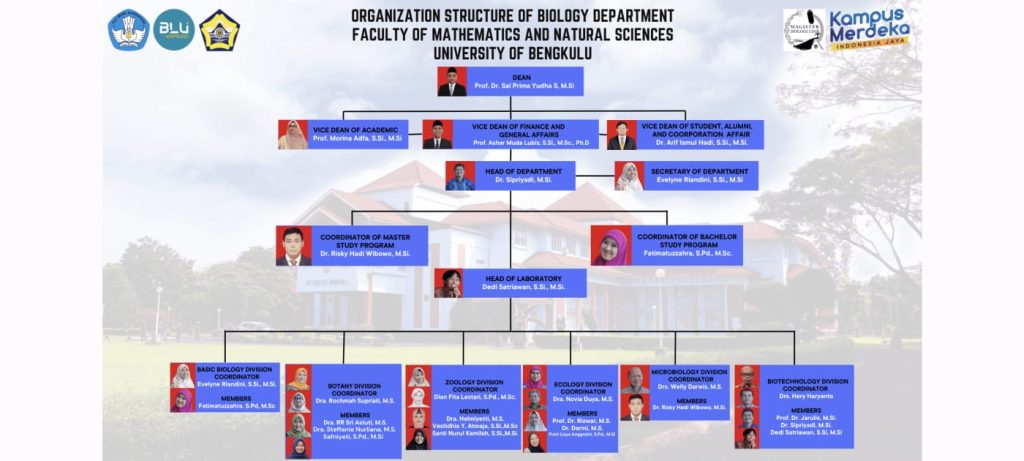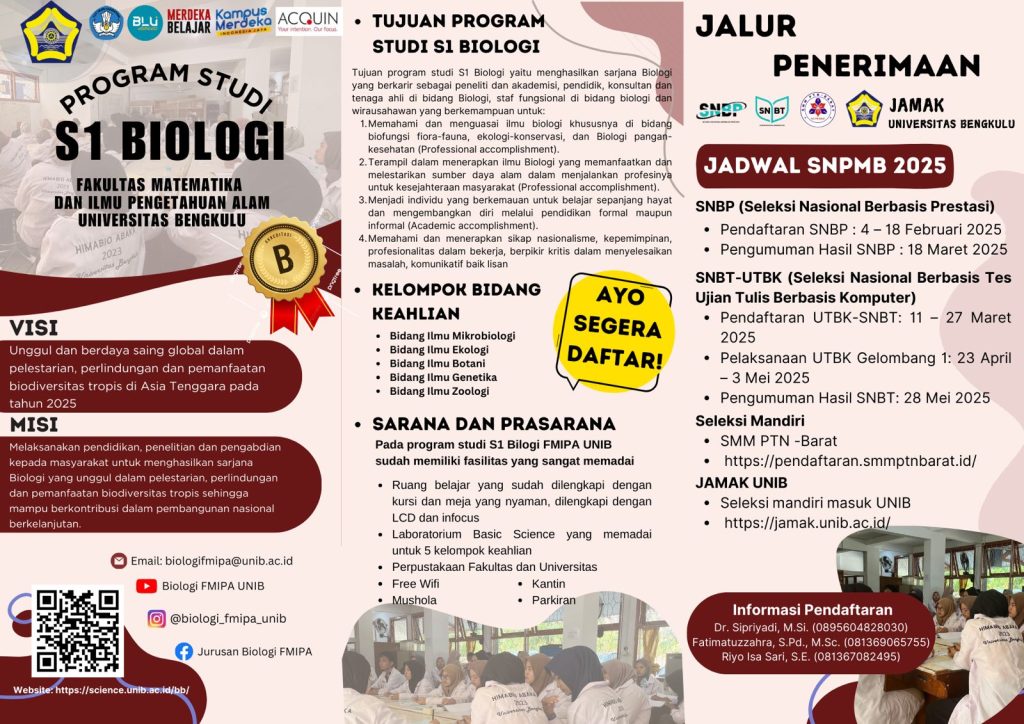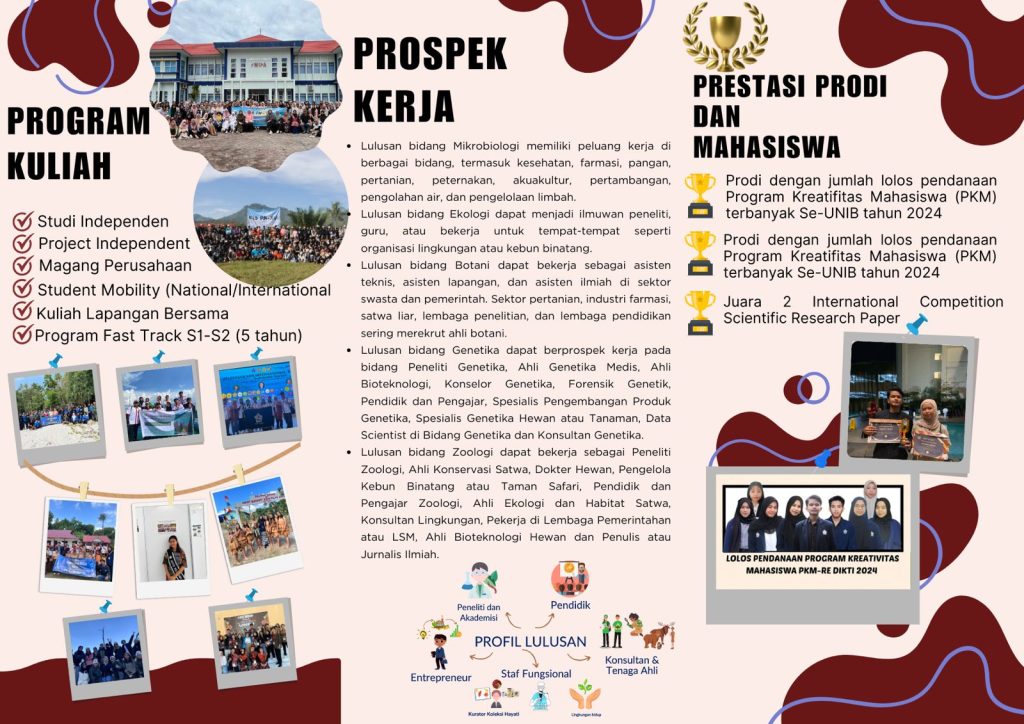The Biological Laboratory was established on May 13, 1993 under the auspices of the UPT MIPA based on the UNIB Rector’s Decree No. 1152 / PT43. H/Q/1993. The UPT MIPA Lab is intended to serve the practicum process for UNIB students, especially FKIP and Faperta. Since August 12, 1999, the Biology Lab under the auspices of FMIPA is in line with the establishment of FMIPA with The Ministry of Education and Culture No. 195/0/1995. At the beginning of its establishment, the Biology Lab consisted of the sublabes Basic Biology, Plant Physiology Anatomy, Animal Physiology Anatomy, Microbiology, Genetics and Biosystematics in the Basic Science Building with a building area of 1100 m2 and Ecology in Building V with a building area of 150 m2. Procurement of tools is carried out in stages in the form of WUTC, HEDS, ADB and DUE projects. The lecturers also support the procurement of tools through peer groups. However, this does not rule out the possibility that practicums and research can be carried out by sharing resources.
Improving the quality of Biology Lab services both for practicum activities and for research continues to be carried out. Gradually the equipment is equipped with a manual of use. The practicum is improved by providing guides and revisions in accordance with current conditions. In 2005/2006 a wire house was established for infrastructure to support practicum and research in the Basic Science Building. In 2012, the Lab division was revised into the divisions of Basic Biology, Botany, zoology, microbiology, biotechnology, and ecology. This revision was carried out to accompany curriculum changes to fulfill the vision and mission of the Biology Study Program while facilitating the development of research by Biology lecturers themselves. In 2021 and 2022, spatial improvement as well as supporting facilities have been carried out in the basic biology and botany division rooms. All divisions will be gradually improved.
The management of the biological lab management is carried out by the Head of the Laboratory who is assisted by 6 division coordinators and 4 PLP (educational laboratory institutions). Since its establishment, there have been 6 replacements of laboratory heads through the issuance of the Rector’s Decree. Each division is filled with 1 division coordinating lecturer and several division members whose knowledge development is in accordance with the division.
- Biology Laboratory
The Bachelor in Biology Study Programme has six laboratories supporting the learning and research activities. Each laboratory is prepared for a different branch of biology. The laboratories are located in the Basic Science Building, Building V, and the Integrated Laboratory Building. Each laboratory is equipped with adequate practicum and research equipment. Structurally, each laboratory consists of several lecturers and one laboratory administrator. Each laboratory is coordinated by a coordinator under the Head of the Laboratory. The use of rooms, tools, and materials by the academic community has been arranged through standard operating procedures.
- Basic Biology Laboratory
The Basic Biology Laboratory is a type of laboratory in the Bachelor in Biology study programme to support the education process, especially in practicum activities for students of FMIPA who take basic Biology courses. Another activity that can be held in the basic biology laboratory is research conducted by lecturers and students to complete thesis research.
- Zoology Laboratory
The Zoology Laboratory is an academic facility for the Bachelor in Biology study programme used by students and lecturers for practicum, research, and community service activities in biosystematics, structure, anatomy, histology, and animal physiology. This laboratory has a collection of several invertebrate and vertebrate animal specimens in wet and dry preserved forms.
- Botanical Laboratory
The Botanical Laboratory is used as a practicum room for several courses related to plants, such as biosystematics, anatomy, morphology, physiology, development, ethnobotany of medicinal and food plants, cryptogamae, aquatic flora, and others. The Botanical Laboratory has dry and wet herbariums of several types of bryophytes, pteridophytes, and angiosperms. Several tools are available in the Botanical laboratory, such as Microtome, Light Microscope, Monocular Microscope, Trinocular Microscope, Binocular Microscope, and Rotary Evaporator.
- Ecology Laboratory
The Ecology Laboratory is intended to use as a place for student practicums activities, especially in the courses of basic ecology, animal ecology, plant ecology, soil biology, and conservation biology. Another activity that can be held in the Ecology laboratory is research conducted by lecturers and students to complete thesis research. Several tools are available in the ecology laboratory: Cold Desiccator Cabinet, Kymograph, Ultrapure Water System, Test Shieve Shaker, and Biological Oxygen Monitor.
- Microbiology Laboratory
The Microbiology Laboratory is a facility for students to conduct Microbiology, Microbial Fermentation, and Micology practicums. This laboratory has been equipped with equipment to support practicum activities. Some of the activities carried out in the practicum include instrument sterilisation, medium preparation, microbial isolation, painting and microbial morphology, qualitative and quantitative analysis of microbes, the influence of environmental factors on microbes, and microbial biochemical activity. This laboratory is equipped with several tools such as a vortex, PCR (Polymerase Chain Reaction) Machine, UV Transluminator (Axygen), Laminar Air Flow, Autoclave, Digital Laboratory Incubator Medium, Cool incubator, UV-Vis Nano Spectrophotometer, and Gel Electrophoresis Equipment.
- Biotechnology Laboratory
The Biotechnology Laboratory is intended for lectures, observations, and research activities in the field of tissue culture. The research activities are in the form of maintenance, growth, and propagation of plant tissues (cells, callus, protoplasts) and organs (stems, roots, embryos) in aseptic culture (in vitro).
In addition to the six laboratories, the Bachelor in Biology Study Programme students can use other laboratories located at UNIB. The entire academic community uses these facilities while following the standard operating procedures that each laboratory has set. Laboratory services are monitored and evaluated through user satisfaction surveys conducted every academic semester.





